 Featured News
Featured News
What’s the difference between the Hospitality Industry and the Service Industry?
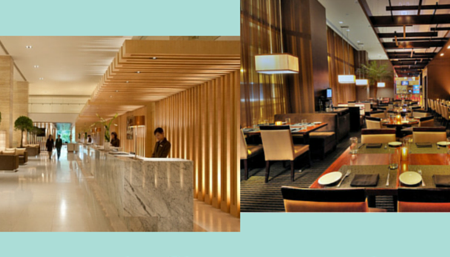 WOW! What IS the difference between the hospitality industry and the service industry? Do you know? Can you tell me?
WOW! What IS the difference between the hospitality industry and the service industry? Do you know? Can you tell me?
I can’t believe I haven’t done this before. I guess I’ve assumed that anyone who is reading my posts would already have an idea of what the Hospitality and Service industries are, what they entail, and how they differ.
Then, I got to thinking. Do I even know the difference well enough to tell someone if asked?
The answer. No. I don’t. And I’m a long time hospitality industry professional. I’ve worked in hotels, restaurants of every type, at event companies, at resorts, convention centers… you name it.
I use the two interchangeably to mean the same thing in some cases, and in others I mean two different things. That doesn’t help anything, does it?
So, for my sake, let’s quickly define the two so that from now on we’re all on the same page.
The Hospitality Industry.
So, here’s what pops up when you google, “What is the hospitality industry?”
“…a broad category of fields within the service industry that includes lodging, event planning, theme parks, transportation, cruise line, and additional fields within the tourism industry.”
When I think hospitality, I think hotels. I don’t know if you do the same, but I won’t make that mistake again.
The Service Industry.
And here’s what you get when you google, “What is the service industry?”
“…business that does work for a customer, and occasionally provides goods, but is not involved in manufacturing.”
Well, I’ve been making another mistake on this one, too. When I was talking about the service industry, I was referring to restaurants and food service establishments.
I’m not really quite sure how I came to call the restaurant industry the “service industry.” I stand corrected.
Well, this has been a humbling experience, but I hope it’s cleared some things up in your head.
Moving forward, I’ll refer to the Hotel Industry and the Restaurant Industry.
I hope you found this quick post informative? If you already knew the difference between the two, then I hope this was a good refresher.
Source:
Marriott’s Alison Ainsworth Talks Spa
 How She’s Growing the Luxury Spa and Wellness Business Across Europe
How She’s Growing the Luxury Spa and Wellness Business Across Europe
We Interviewed Alison Ainsworth, Senior Director of Golf, Leisure & Spa Operations Europe for Marriott Hotels. Alison overseas about 36 Health and Beauty centers located within their membership-based fitness centers in Marriott Hotels across Europe. Alison is currently rolling out SpaSoft Online Booking at several spas in Europe. We talked to Alison about what makes an incredible spa experience and other spa topics.
On What Makes a Great Spa Visit
The first thing is the actual experience. The experience of how you’re welcomed into the spa. There’s an expectation that you’re going to go there and you’re going to get a great feeling about being at the spa. That people are going to understand what you need and going to be able to tailor the service to you.
“It’s no use having great services and great treatments if you don’t tell anyone about them.”
But to make a great spa business, it’s no use having great services and great treatments if you don’t tell anyone about them. You have got to have great marketing, PR, and sales plan activity, because if you don’t have that foundation, then it’s all for nothing.
To enable you to do that, you’ve got to have business acumen behind you and you have to understand the data and have a good knowledge of what your business is telling you. Where your treatments are coming from, what margins you’re making, what you need to be promoting, what’s happening locally.
On the Role of a Spa Manager
You can give great treatments, but if you have nobody coming through the door or you’re not marketing yourselves you become the best kept secret going. Or if you’re giving great treatments but actually it’s costing you because you’re not making any money it doesn’t make a great successful business. It’s a bit like restaurants as well, you can provide some phenomenal food but if nobody knows about it or you’re not controlling the cost or the menu that you’re putting out there, you’re not going to make a lot of money.
So that’s the role of the spa manager to make sure that kind of all happens. You’ve got to have that balance, you’ve got to have the data you’ve got to have that business acumen, the marketing plan behind it but you’ve also then got to be able to deliver on the experience when the person comes to your spa. And then that experience becomes self-fulfilling and those people will recommend and come back again.
On Hotel and Resort Spas
Spa can have a reputation of not being a strong contributor to the bottom line of the hotel. I think those of us in the spa industry suffered under this belief over the years, because often hotel management doesn’t have as much understanding of what makes a good spa business.
But I think now, within our spas at Marriott, we’ve placed a lot of scrutiny on the bottom line of the spa. What is it making? How are managing our service time? How we’re scheduling? How are we managing our costs? The hotel owners especially are absolutely zeroed in on that. Spas have to make money.
On Incorporating Local Culture Into Spa
We have to broaden our spa offerings, especially in Europe,. Most of our spas will now have a very local flavor to them. We’ve just opened a hotel in Macedonia and we’ve got three different types of sauna, various experience showers, and great heated relaxation areas because that’s an expectation of the culture. Local customs, backgrounds, histories and cultures have changed the way that we build our spas and what we put into them, as well as just offering traditional massage and facial.
For savvy spa goers it’s a great experience. Also for people who are not so used to having spa treatments. The fact that it’s in the hotel gives them that security that they’re not having to go out. They’re within the comfort of the hotel, the security of theMarriott or Ritz-Carlton name across the door makes sure it’s going to be okay.
“I love the freedom and creativity that spa brings.”
What She Loves About Spa
I love the fact that with spa, because we sit a little bit out of the mainstream of the hotel, we absolutely have the freedom to innovate and change and really shape and make our business what we want it to be. I love the freedom and creativity that spa brings.
Source: http://www.hospitalitynet.org/news/global/154000320/4076812.html
Luxury Hotel & Resort Photographer Antonio Cuellar Named Hotel Judge of 2016 “Luxury Travel Guide”
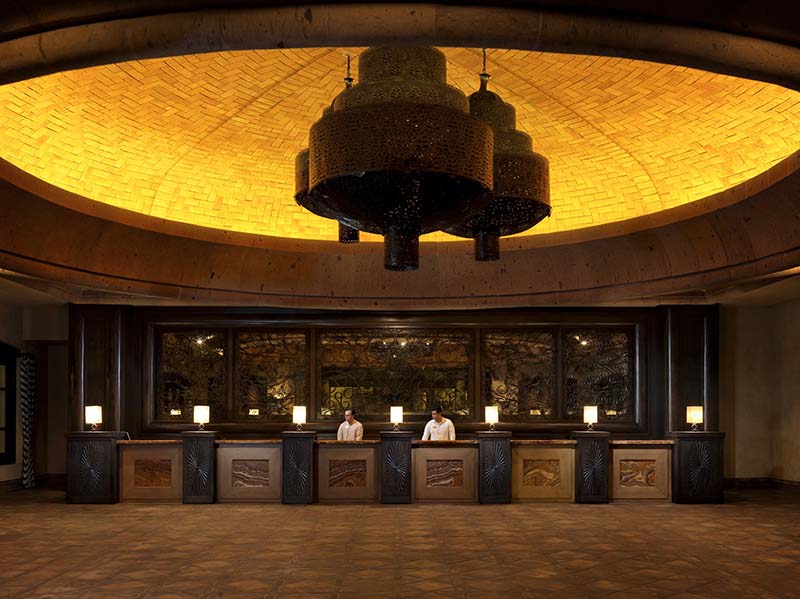 In recognition of his award-winning work as a hospitality photographer,luxury hotel & resort photographer Antonio Cuellar was recently invited to serve as hotel judge for “Luxury Travel Guide: An Insight for the Affluent Traveler.” The 2016 guide showcases the sleekest and most stylish hotels in Europe. Two other judges for the guide include Travel Channel TV hosts Shane Green Fom “Resort Rescue” and Anthony Melchiorri from “Hotel Impossible”.
In recognition of his award-winning work as a hospitality photographer,luxury hotel & resort photographer Antonio Cuellar was recently invited to serve as hotel judge for “Luxury Travel Guide: An Insight for the Affluent Traveler.” The 2016 guide showcases the sleekest and most stylish hotels in Europe. Two other judges for the guide include Travel Channel TV hosts Shane Green Fom “Resort Rescue” and Anthony Melchiorri from “Hotel Impossible”.
“I am honored to be named a hotel judge for this exclusive guide and to do what I do every day,” Cuellar said. “Hotels have become true destinations, with interior and exterior beauty, thoughtful accommodations, impressive architecture and real character – making them the perfect vehicle for photography. I love what I do every day and enjoy the chance to see the real through the lens of the camera, capturing interest and beauty along the way.”
In addition to his work on the “Luxury Travel Guide: An Insight for the Affluent Traveler,” Cuellar is working on a book of luxury castle hotel accommodations in Europe, to be published in early 2017.Cuellar specializes in creating images for luxury hotel marketing. Fluent in English and Spanish, Cuellar’s hotel photography career has taken him to the United Arab Emirates, Ireland, UK, Mexico, Africa and Italy, among others.
Source: http://www.hospitalitynet.org/news/global/154000320/4076817.html
EasyJet urges prioritisation of UK access to EU market
 K budget carrier EasyJet is to concentrate on talks with European governments to ensure that its operations are not interrupted by the UK’s decision to break away from the European Union.
K budget carrier EasyJet is to concentrate on talks with European governments to ensure that its operations are not interrupted by the UK’s decision to break away from the European Union.
The airline says its initial aim is to “accelerate” discussions with governments and regulators to make sure that the UK remains within the single European aviation market.
Chief executive Carolyn McCall says that the airline has urged the UK government and European Commission to “prioritise” this objective.
“This would enable EU airlines to fly freely within the UK and between the UK and the EU, allow UK airlines to fly freely across Europe and would ensure that consumers continue to benefit from low fares,” says the carrier.
EasyJet insists the result of the 23 June referendum “will not have a material impact” on its strategy or ability to deliver sustainable growth.
It says is has been preparing for the possibility of a UK exit from the EU and that it has been “working on a number of options” to allow it to maintain flights to all of its markets.
Alongside the regulatory discussions, it says, it will “continue to develop” these alternatives in order to retain its network.
Source: https://www.flightglobal.com/news/articles/easyjet-urges-prioritisation-of-uk-access-to-eu-mark-426676/
Canine check in: The rise of pet-friendly hotels
You may think it is barking mad, but in Vienna a hotel arranges for dogs to go to the opera without their owners.
The cultural nights out for canines are organised by the five-star Park Hyatt Vienna, which allows people to check in with their dogs or cats, and aims to be as pet-friendly as possible.
If a guest wants a night out in the Austrian capital without his or her dog, but doesn’t want the pooch to get lonely on its own in the hotel room, staff can step in.
In addition to the more usual requests for dogs to be walked, the hotel can arrange for an employee to take the animal to the theatre.
“If the pet wants to go to the opera by himself we will arrange their ticket if the opera allows it,” says the hotel’s general manager Monique Dekker.
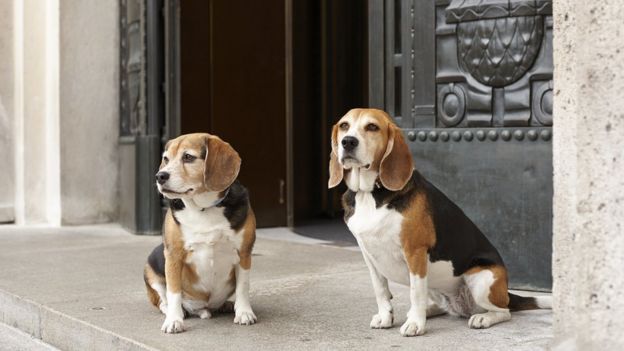
“If he loves Madam Butterfly, then please go ahead.”
Meanwhile, other guests with a dog once asked the hotel to arrange some exclusive transport just for their pet.
“We have had one dog that has been transferred by a limo because the guests were somewhere else, and they suddenly wanted their four-legged friend to come to where they were. For us the sky is the limit,” says Ms Dekker.
Very Important Dogs
While most pet-friendly hotels don’t go to quite the levels of the Park Hyatt Vienna, it is in fact indicative of the big growth in recent years in the number of hotels that allow people to check in with their dogs, cats or other animals.
Bookings website Hotels.com says: “We have witnessed a huge increase in demand for pet-friendly hotels, and guests wanting to travel with their animals.
“Demand is growing year-on-year, with a large proportion of hotels across the globe now not only accommodating for pets, but also advertising this key feature.”
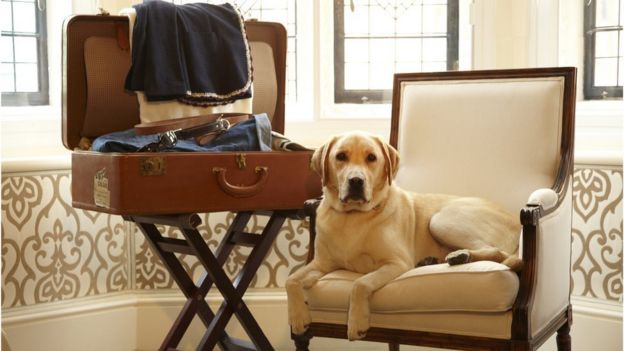
Hotels.com says that a quarter of the 325,000 hotels it now lists around the world allow people to check in with their pets.
For most pet-friendly hotels, guests wishing to bring their pets with them have to pay an initial surcharge. For instance, the Park Hyatt Vienna’s “Very Important Dog” programme costs €35 ($40; £27). Food and other services, such as dog walking or sitting, or a trip to the opera, are then charged on top.
‘Woof Waffles’
The Milestone Hotel in central London has its own “pet concierge”.
Georgia Wood, who holds the role, says the hotel does all it can to “make sure the pets have just as great a stay here as the guests”.
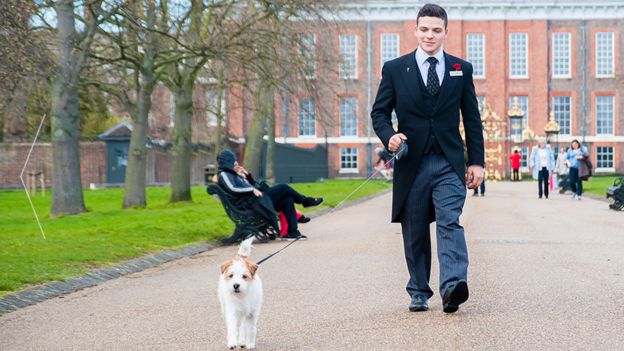
She adds: “We send a pet preference form prior to someone’s arrival, and I’ll just ask for the breed of the dog, the size of the dog, if there are certain things the dog likes to eat.
“When we have this information, we can then, prior to your arrival, set up the room, set up the dog bed.”
In addition to offering dog-sitting and walking, the Milestone has an extensive menu for dogs and cats, which can be ordered as room service 24 hours a day.
Dishes include “Woof Waffles” (two grilled potato waffles with a large Cumberland sausage, £5.50), and “Meaty Muncher” (chunks of steak in gravy, served with creamed mashed potatoes, £7.50).
Doggy damages
Ms Wood says that the hotel hosts three or four pets in an average week. Mostly these are cats and dogs, but occasionally a guest will bring other animals, such as parrots and rabbits.

If a guest does arrive with a pet, they had better be sure that the animal is well behaved, because the Milestone – which is full of antique furniture – takes a £1,000 returnable deposit in case of any damages.
Christine Fulton, head housekeeper at the Chesterfield Mayfair Hotel in central London, says hotels that allow pets are generally much more welcoming. “It makes the hotel feel like a home,” she says.
“Our team enjoy the novelty of having pets at the hotel, whether it is walking the dogs or babysitting animals while their owners enjoy time in London.
“Many of our staff are unable to keep a pet for various reasons, and this gives them a chance to have the companionship of an animal for a while.”
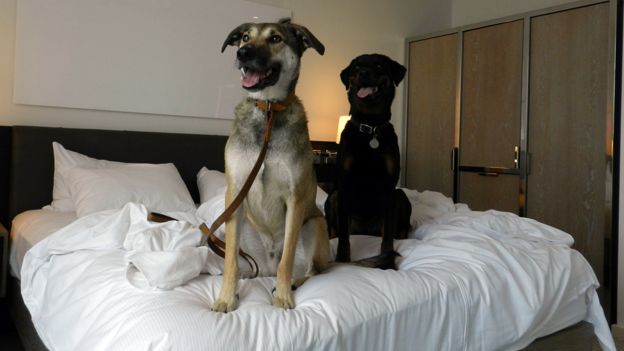
Nadine Kayser, founder of dogs charity Wild at Heart Foundation, regularly travels throughout Europe with her husband and two rescue dogs Bally, a Romanian shepherd-mix, and Ivy, a Rottweiler-Labrador cross.
“The most important question we always ask is: do they allow dogs?” she says.
“Some allow them in certain parts of the hotel, which is fine for us, as long as they can sleep in the same room.”
‘My baby’
Back in Vienna, Simone Dulies, the general manager of the pet-friendly Hotel Bristol, takes her dog Brix, to work with her every day.
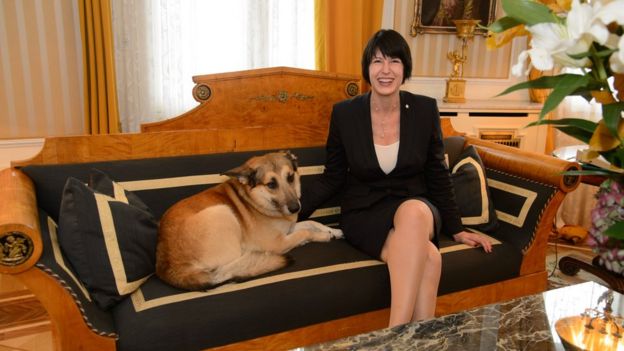
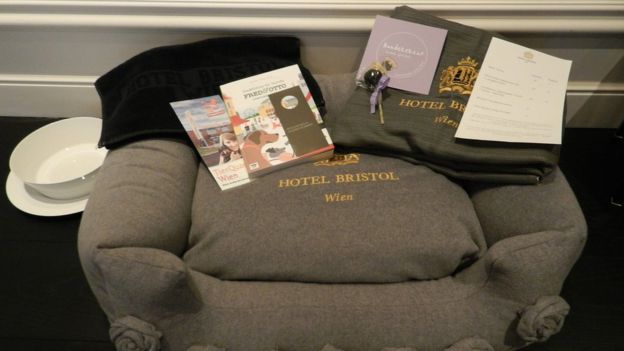
She says it isn’t enough for hotels to tolerate pets, they have to make them feel genuinely welcome.
“[The welcome for pets] needs to be honest, otherwise you see it as just a bit of marketing,” she says.
“My dog is like my baby, so if a hotel is nice to my dog, the same as it should be to a mum with her kids, then that’s some major brownie points from me.”
Best Western enters Tokyo’s vibrant Machida district
 Best Western® Hotels & Resorts has continued to expand its presence in Japan with the launch of a new hotel in the vibrant Machida district of Tokyo.
Best Western® Hotels & Resorts has continued to expand its presence in Japan with the launch of a new hotel in the vibrant Machida district of Tokyo.
Now open to guests, BEST WESTERN Rembrandt Hotel Tokyo Machida is located in the western part of the Tokyo metropolitan area, with excellent transport links – including extensive rail connectivity – to the city center and other parts of Japan.
For example, the popular Tokyo district of Shinjuku is only 35 minutes away via the Odakyu Line, and it takes just 20 minutes to travel to Yokohama on the JR Yokohama Line. Alternatively, guests can stay in Machida and explore the local area, which is blessed with multiple parks, museums and shopping malls.
The hotel features a sleek, modern design and all rooms come equipped with contemporary amenities such as flat-screen TVs and complimentary Wi-Fi. Many of the rooms also feature panoramic windows that offer stunning views of the Machida skyline and the glittering lights of Tokyo beyond.
Guests have a choice of dining options, with the Carillon Restaurant serving delicious local Japanese and international dishes, along with sumptuous buffets, and Long Fuang Restaurant specializing in exquisite Chinese cuisine.
Best Western Rembrandt Hotel Tokyo Machida also features a range of options for meeting and event planners, including wedding services, function rooms and space for private parties.
“I am pleased to welcome BEST WESTERN Rembrandt Hotel Tokyo Machida to our extensive collection of hotels in Japan,” commented Olivier Berrivin, BEST WESTERNHotels & Resorts’ Managing Director of International Operations – Asia. “With its excellent location and connectivity, modern design and array of international amenities, I am confident it will become a popular destination for both business and leisure travelers.”
Best Western operates a large portfolio of hotels all across Japan, from the snow-capped peaks of Hokkaido in the north to the beaches of Okinawa in the south. BEST WESTERN Rembrandt Hotel Tokyo Machida becomes the company’s second property in the Tokyo metropolitan area, following the BEST WESTERN Tokyo Nishikasai.
Source: http://www.hospitalitynet.org/news/global/154000320/4076783.html
Jetsetter Announces Annual 2016 “Best Of The Best” Hotel Awards
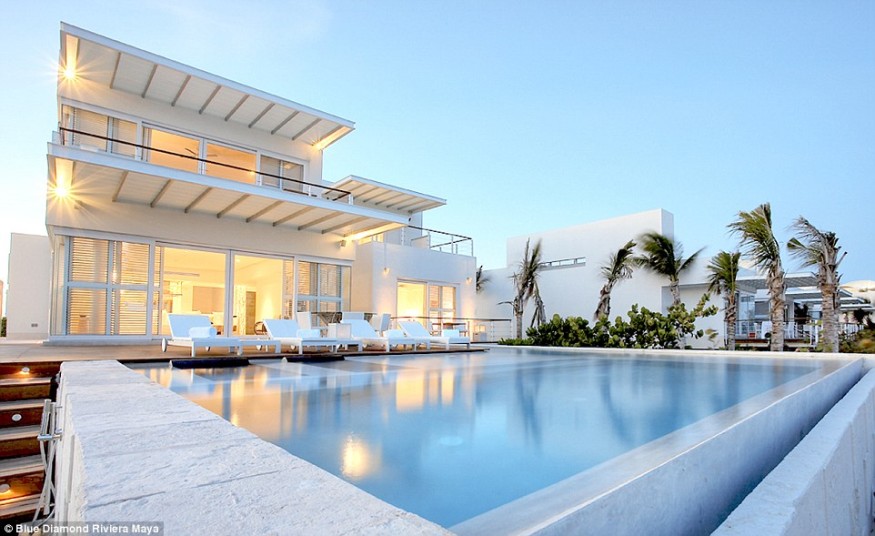 Jetsetter.com, the world’s go-to brand for travelers with discerning taste, today announced the winners of its annual 2016 Best of the Best hotel awards. This year’s awards include 20 “Best” categories ranging from Over-the-Top Luxury and Best-Looking Guests to All-Inclusive and Nightlife. Each category includes a winner and one runner-up.
Jetsetter.com, the world’s go-to brand for travelers with discerning taste, today announced the winners of its annual 2016 Best of the Best hotel awards. This year’s awards include 20 “Best” categories ranging from Over-the-Top Luxury and Best-Looking Guests to All-Inclusive and Nightlife. Each category includes a winner and one runner-up.
Senior Editor Clara Sedlak notes, “Our annual Best of the Best awards highlight the top properties around the world, from big city sleeps to boutique stays in remote locations. Narrowing down this year’s list wasn’t easy—we evaluated hundreds of hotel submissions from our global correspondents and after hours of deliberation, we selected these 20 outstanding properties.”
The Winners:
- Best Big City Sleep: Cotton House Hotel, Autograph Collection, Barcelona
- Best Style Steal: The Hoxton, Amsterdam
- Best Boutique: G-Rough, Rome, Italy
- Best for Romance: Barbuda Belle Luxury Beach Hotel, Barbuda
- Best Design: Brown Beach House, Tel Aviv
- Best on the Beach: Zemi Beach House Resort & Spa, Anguilla
- Best All-Inclusive: The BodyHoliday, St. Lucia
- Best Over-the-Top Luxury: Faena Hotel, Miami Beach
- Best Looking Guests: Soho House Istanbul, Istanbul
- Best Nightlife: The Miami Beach EDITION, Miami
- Best Pool Scene: L’Horizon Hotel and Spa, Palm Springs
- Best Comeback: Ritz, Paris
- Best Safari-Lodge: Singita Ebony Lodge, Kruger Park, South Africa
- Best Business-Meets-Pleasure: The Knickerbocker, New York City
- Best for Communing with Nature: Pumphouse Point, Lake St. Clair, Tasmania
- Best for Wellness: The Gainsborough Bath Spa, Bath, England
- Best Far-Flung Escape: Six Senses Ninh Van Bay, Vietnam
- Best Grounds: Ashford Castle, Ireland
- Best For Families: Four Seasons Resort Hualalai, Hawaii
- Audience Favorite: Blue Diamond, Riviera Maya
Behind the Awards The editorial team sent categories to more than 200 travel correspondents globally, then compiled their suggestions along with the Jetsetter team’s. The Jetsetter Best of the Best hotel awards represent hotels that truly encapsulate the outstanding experiences members have come to expect from properties on Jetsetter. Editor Sedlak commented, “Our annual awards are a way for us to celebrate those properties around the world that go above and beyond. At Jetsetter we understand that travel choices are personal. The award categories reflect the variety of things our audience value in a hotel, from style and design to service, food and amenities.”
Jetsetter.com provides great hotel deals, in-the-know destination guides and useful travel tips to its more than 33 million members. From hotels to insightful stories to trip planning, Jetsetter is designed to match discerning travelers with their ideal travel experience. Each property featured is hand-selected by a team of curators and by Jetsetter’s global network of correspondents. Jetsetters can browse limited-time sales of up to 40% off, peruse the Jetsetter permanent collection of more than 6,500 hotels and resorts or find travel ideas and inspiration in the newly redesigned Magazine. Jetsetter app available in the Apple App Store. For more information, visit http://www.jetsetter.com.
Source: http://www.hospitalitynet.org/news/global/154000320/4076726.html
Conrad Hotels & Resorts Debuts Smart Luxury in the Philippines with Opening of Conrad Manila
 Today, the inspired luxury of Conrad Hotels & Resortsmakes its debut in the Philippines with the opening of Conrad Manila. Owned by SM Hotels and Conventions Corporation, a subsidiary of SM Investment Corporation and managed byHilton Worldwide (NYSE: HLT), the 347 room Conrad Manila is located at the forefront of the Mall of Asia complex, in the heart of the 42 hectare Bay City development, a destination earmarked as a shopping, leisure, and business hub.
Today, the inspired luxury of Conrad Hotels & Resortsmakes its debut in the Philippines with the opening of Conrad Manila. Owned by SM Hotels and Conventions Corporation, a subsidiary of SM Investment Corporation and managed byHilton Worldwide (NYSE: HLT), the 347 room Conrad Manila is located at the forefront of the Mall of Asia complex, in the heart of the 42 hectare Bay City development, a destination earmarked as a shopping, leisure, and business hub.
“We are delighted to establish Conrad Hotels & Resorts in this vibrant capital of Manila. The award-winning Conrad Manila, which enhances our portfolio, underscores our commitment to delivering best-in-class hotels in key gateway locations that meet the growing needs of global luxury travelers. An inspiring destination, Conrad Manila will delight guests with intuitive and customized service, as well as provide them access to a world of connections and inspired experiences,” said John T. A. Vanderslice, global head, Conrad Hotels & Resorts.
“The stunning Conrad Manila is an exceptional addition to the Conrad Hotels & Resorts portfolio and we are delighted to be partnering with SM hotels on this exciting project, who share our passion for excellence. Its opening underscores the growth of our portfolio across Asia Pacific and our continued commitment to the dynamic market of the Philippines. This landmark property perfectly complements the vibrancy of this amazing capital city and will set the benchmark for luxury accommodation in Manila,” Martin Rinck, president, Hilton Worldwide, Asia Pacific.
“We are pleased to work with Hilton Worldwide in bringing the esteemed Conrad brand to Manila. Amidst the robust tourism outlook, the most anticipated opening of ConradManila will definitely be a game changer in the already exciting Philippine hotel scene,” says SM Hotels and Conventions Corp. President Elizabeth T. Sy. “We look forward to a fruitful partnership with Hilton Worldwide in further elevating the hotel industry in the country,” adds Ms. Sy.
Recently awarded the Best in Hotel Development, Best Hotel Architectural Design and Best in Hotel Interior Design at the fourth annual Philippines Property Awards, ConradManila’s distinctive architecture is inspired by the shipping vessels that ply the bay. The hotel sits atop the two-level S Maison, a high-end retail complex, and has direct connections via walking bridges to SMX Convention Center, the country’s largest convention space, and is adjacent to SM Mall of Asia, one of the country’s largest malls, as well as Mall of Asia Arena, a 16,000-seater indoor stadium where international shows, concerts and major sporting events are held.
Poised to be the venue of choice for business, social events, and weddings, ConradManila offers four contemporary event halls and two sophisticated ballrooms, spanning more than 4,000 square meters, which are fitted with state-of-the-art audio-visual technology. For intimate al fresco parties, guests can also opt for The Veranda, an outdoor garden space overlooking the city scape.
At Conrad Manila, all 347 guest rooms and suites are specially designed with an intuitive technology. Upon sensing motion in the room, the air conditioning switches from energy-saving mode to cool, the curtains in the room will automatically open with ambient lighting set to match the time of the day. Guests can instantly feel at home with a 42-inch flat screen HDTV with an IPTV menu, Wi-Fi and wired Internet access, Nespresso machine, Bluetooth-enabled entertainment technology and hydrotherapy rain showers. Suites and executive rooms offer picturesque bay or city views, with access to the Executive Lounge, and bathrooms that feature in-mirrored TV for an uninterrupted entertainment experience.
Located on the third level of the hotel is the infinity swimming pool, inspired by the pristine coastal seas of the Philippines with its coral shape. Guests may also slip to the 24-hour Fitness Center or the Conrad Spa, which offers a variety of locally inspired treatments using organic ingredients. The spa has six treatment rooms with soaking tubs, a private sauna, and steam facilities.
The hotel has six restaurants and lounges, including a coffee bar, pool bar, and in-room dining prepared by the culinary team led by Executive Chef Thomas Jakobi. The restaurants and bar at Conrad Manila feature:
- Brasserie on 3 offers an eclectic mix of sustainable and organic dishes ranging from hearty to healthy dishes. The restaurant also features al fresco dining overlooking the bay, private dining rooms for intimate celebrations, and an exclusive chef’s table, where diners can enjoy a special tasting menu with a curated selection of organic wines.
- China Blue by Jeremy Leung presents a modern interpretation of the traditional Chinese cuisine, artfully curated by Chinese celebrity master chef, Jereme Leung. A first for a Chinese restaurant in the Philippines to partner with a celebrity chef, China Blue by Jereme Leung takes Chinese dining experience to a new high with its authentic cuisine, modern interiors, and floor-to-ceiling glass windows that offer panoramic bay views.
- C Lounge is inspired by the city’s distinctive culture and lifestyle, where guests can enjoy a wide selection of beers, liquors, and locally-inspired cocktails. With a laidback vibe during the day, it transforms into a sophisticated destination bar at night. Its al fresco area offers guests an awe-inspiring visual of the Manila sunset.
- Source: http://www.hospitalitynet.org/news/global/154000320/4076667.html
Hotelogix & ProTurismo Announce Partnership To Shift Colombian Hotels To The Cloud Platform
 Global PMS providers Hotelogix have partnered with Colombian consultancy ProTurismo to provide hotels in the region with a comprehensive management solution and spread awareness of the benefits of cloud computing.
Global PMS providers Hotelogix have partnered with Colombian consultancy ProTurismo to provide hotels in the region with a comprehensive management solution and spread awareness of the benefits of cloud computing.
Hotelogix and Proturismo have announced a partnership to help properties in Colombia switch to the modern, cloud platform. The leading hospitality consultancy have tied up with the region’s Chamber of Commerce and organized a summit on the 16th of June to spread awareness about the benefits of cloud computing and address any concerns hoteliers may have regarding the migration process. The speakers will also discuss key takeaways from Caribbean hotspot Aruba’s rise to prominence as a leading tourism destination.
In-premise systems, still used by a number of properties, are no longer capable of supporting the growing needs of hotels in today’s fast-paced environment. The systems also demand large upfront costs and require high level of maintenance, contributing to significant overhead expenses. Cloud-based systems eliminate all these costs as the system is housed in an off-shore cloud server. Moreover, this allows hotel owners to access the system from anywhere in the world with an internet connection and computer. Cloud technology also allows hotel owners to take advantage of the numerous online distribution portals available without any of the risks associated with managing inventory on so many platforms – real-time integration eliminates double-bookings and owners can update rates across all channels from a single point-of-control.
Proturismo intends to develop hospitality and tourism in the region by educating small and mid-sized hotel owners about these limitations of in-premise systems. With tourism in Colombia growing annually, the organization decided that a collaboration with Hotelogix was the right move. The global PMS provider’s cloud-based solution is specifically built for small and mid-sized properties, and can be implemented quickly in a short span of time. The joint partnership has already started enabling properties in the region to experience the benefits of the platform – as in the case of the Solar Villa, a seven room bed & breakfast that switched to the cloud a week ago. “SME is a growing segment and these hotels need a solution that will help them raise their quality of operations and at the same time reach international markets to expand their reach outside the country – Hotelogix offers the perfect solution for these needs,” said Freddy Vargas, director of Proturismo.
With clients in over 100 countries, Hotelogix have been providing cloud-based management and distribution solutions to independent and group accommodation providers, enabling them to access enterprise-level tools at an affordable rate. The company also provides subscribers with a free channel manager, enabling clients to gain global visibility by connecting to premium OTAs such as Expedia, Agoda and more; allowing small and mid-sized properties to compete with much larger brands.
“SMEs make up the fastest growing segment in hospitality and their need for an efficient, comprehensive solution cannot be ignored. Our vision has always been to empower these properties by providing them with a powerful cloud-based PMS capable of rivalling systems used by the evolved brands, and we believe that our partnership with Proturismo gives us a fantastic opportunity to help this segment grow in Colombia,” said Aditya Sanghi, CEO and co-founder of Hotelogix.
Cloud-based systems will be the only viable option for hoteliers looking to stay competitive in an increasingly congested marketplace and properties joining the cloud sooner will have a distinct advantage over those that continue to ignore the platform.
Source: http://www.hospitalitynet.org/news/global/154000320/4076596.html
Early Check In: What Does It Really Deliver?
 Whether guests check in remotely before arrival or show up way before check-in time – room availability makes everyone toe the line
Whether guests check in remotely before arrival or show up way before check-in time – room availability makes everyone toe the line
Lately I’ve been wondering if mobile check-in is all that it’s cracked up to be. Sure, it’s supposed to zip me from the front door to my room, but depending on the hotel I choose, the time of day, whether I arrive earlier or later than planned, and many other factors, the direct-to-your-room experience doesn’t always deliver on its promises.
As a frequent traveler myself, I often wonder if other travelers feel as I do about mobile check in. Not only am I unsure if I like it, but I question whether or not it provides any advantages. One thing is certain, whether travelers like mobile check in or not, studies show travelers “say” they want it.
Business travelers especially seem hip to the idea of skipping another queue – me included. Not every “check-in before arrival” process avoids the front desk, but many do offer an express line to grab your key and go to your room. If this isn’t offered, a mobile key program may work even better; here my cell phone becomes my room key and it enables me to bypass the front desk altogether. Regardless of how I skip the traditional check-in process, mobile check-in programs are geared to help eliminate, or significantly reduce, the time spent waiting in long lines to get my reservation processed.
When given the option to skip registration and avoid the front desk, I take it. For one, it makes me feel good and gives me a shot at accelerating check in; and two, I have a certain level of professional curiosity to see how the hotel or brand is managing this process. Now, in the rare instance that my phone is turned into a magic room key that unlocks my room door and I can bypass the front desk altogether, I am elated! But . . . when I get into my room, my feeling of delight quickly begins to change.
I didn’t realize the hotel had a club, and I forgot to specifically ask about a quiet room – that my bad. However, I also didn’t get the room type that I requested when I made the reservation. I specifically requested a room on a higher floor, away from noise such as from elevators and vending machines, the pool or other distractions. Also, the room had a bath tub and not the shower I asked for. Instead of the King bed I booked, I was given a Double Double.
Several questions now come to mind:
- Is the price that I pay for mobile check in convenience a compromise in choice or fulfillment of my preferences?
- Would I have received a better room, had I checked in later or at the front desk, where I can be presented with options and maybe even sweet-talk my way to a better room-type category?
- Did my advance check in before my arrival just cause me to be given one of the first rooms that became clean on my day of arrival – rather than a room I really wanted?
- As a loyalty member for that brand, did I receive the upgrade I am entitled to? As it is based on availability, what is the point in time that validation is made?
Suddenly I realize that my time in this room is precious – and the many hours I have until the next morning seems a lot compared to the minutes I saved during check in. Does this make me want to wait in a queue again?
Time Saved vs. Overall Experience
As a professional in the lodging industry, I know of course that much of the time savings aren’t really savings at all, but rather shifts in time – a spreading of the workload. The night shift may be able to now do even more to prepare the arrivals. But once you get to the hotel, is your pre-assigned room really ready, or will it need to be changed a few times over to allow even earlier arrivals to get to their rooms so they aren’t just waiting in the lobby? Is there a better way to make the entire process more fluid and more precise, regardless of your method of checking in?
Working in the hotel technology space, I am interested in the hotel’s perspective. How does the front office team cope with the new mobile check in functionality? Is the time I saved as a guest time they save in operations as well? Does hotel management see a rise in guest satisfaction and loyalty? How often do guests still need to see a front desk associate because of issues with the key, the process, or the room itself? In the end, is this all about mobile check in or about not wanting to wait in line needlessly?
Having talked to many room operations staff over the last year, it is clear that the fundamental requirement of a good mobile check-in solution is not the ability to show the right room (or any room number for that matter) at the time of check in, but rather to automate the underlying reservations in queue. It is not possible to predict actual check-in time, nor is it possible to predict which of the rooms that were occupied when the mobile check-in occurred (generally up to 24 or 48 hours in advance) would be ready, vacant and clean to check into at that unpredictable time of arrival. Add to that the important question of priority. Is the most fitting room the one that should be given to a guest checking in early, or from a mobile device? The most valuable guests often arrive the latest, but should they really be the ones to have the leftover rooms?
For those reasons, I think it is important that we recognize not only the promise of mobile check-in, but also the challenges it helps uncover. Rather than dismissing these as side effects stemming from still low adoption or missing smartphone locks, we need to embrace these failures and think about using the resulting insights as a guide to addressing the real underlying challenges.
A recent Skift article titled: “This Is 2016. Why Can’t We Still Book Specific Rooms in a Hotel?” poses a very insightful question. The article quotes a mobile check-in vendor who clearly recognizes that the underlying issues lie with room selection, room assignment, and the impacted fragmentation that room selection/assignment can have on overall occupancy and RevPAR. As an industry, it’s time we deal with these critical questions.
Source: http://www.hospitalitynet.org/news/global/154000320/4076599.html
